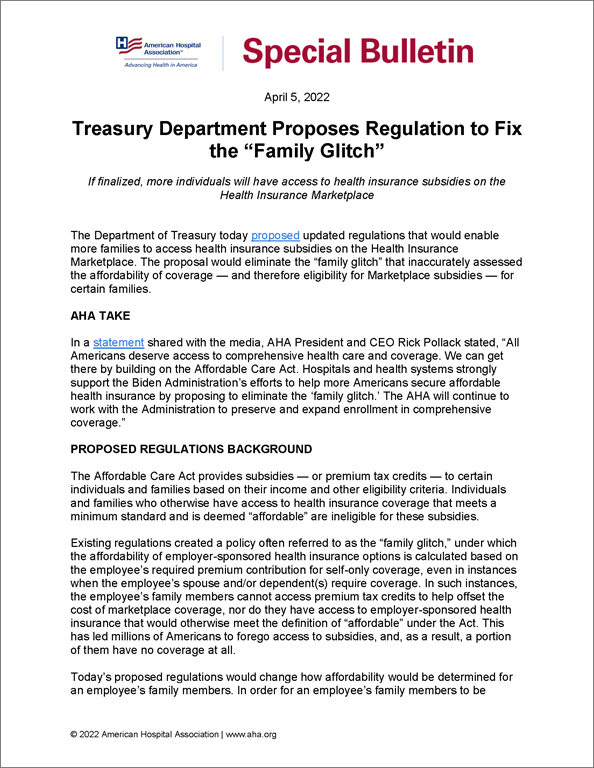Treasury Department Proposes Regulation to Fix the “Family Glitch”
Special Bulletin
April 5, 2022
If finalized, more individuals will have access to health insurance subsidies on the Health Insurance Marketplaces
The Department of Treasury today proposed updated regulations that would enable more families to access health insurance subsidies on the Health Insurance Marketplace. The proposal would eliminate the “family glitch” that inaccurately assessed the affordability of coverage — and therefore eligibility for Marketplace subsidies — for certain families.
AHA TAKE
In a statement shared with the media, AHA President and CEO Rick Pollack stated, “All Americans deserve access to comprehensive health care and coverage. We can get there by building on the Affordable Care Act. Hospitals and health systems strongly support the Biden Administration’s efforts to help more Americans secure affordable health insurance by proposing to eliminate the ‘family glitch.’ The AHA will continue to work with the Administration to preserve and expand enrollment in comprehensive coverage.”
PROPOSED REGULATIONS BACKGROUND
The Affordable Care Act provides subsidies — or premium tax credits — to certain individuals and families based on their income and other eligibility criteria. Individuals and families who otherwise have access to health insurance coverage that meets a minimum standard and is deemed “affordable” are ineligible for these subsidies.
Existing regulations created a policy often referred to as the “family glitch,” under which the affordability of employer-sponsored health insurance options is calculated based on the employee’s required premium contribution for self-only coverage, even in instances when the employee’s spouse and/or dependent(s) require coverage. In such instances, the employee’s family members cannot access premium tax credits to help offset the cost of marketplace coverage, nor do they have access to employer-sponsored health insurance that would otherwise meet the definition of “affordable” under the Act. This has led millions of Americans to forego access to subsidies, and, as a result, a portion of them have no coverage at all.
Today’s proposed regulations would change how affordability would be determined for an employee’s family members. In order for an employee’s family members to be considered to have access to affordable coverage, the employee’s required premium contribution for a plan covering the family members could not exceed 9.5% of household income. Family members that do not have access to affordable employer-sponsored coverage based on the new definition would be eligible for premium tax credits. However, if the employee has access to self-only coverage that is affordable based on the previous definition (i.e., self-only coverage premiums that do not exceed 9.5% of household income), the employee would not be eligible for premium subsidies as they would be deemed to have access to “affordable” coverage; only their family members would be eligible for premium subsidies.
The proposed regulations also update the definition of the minimal value the employer-sponsored plans must meet, in line with the affordability changes. A plan’s share of the total allowed cost of benefits provided to the employee must be at least 60% to be considered of minimal value. If finalized, the minimum value requirement would apply to each individual family member, meaning that the plan’s share of the total allowed cost of benefits provided to each covered family member(s) would also need to be at least 60%. In addition, to conform with rules by other agencies that have a role in overseeing the marketplaces, employer-sponsored health insurance benefit plans would need to include substantial coverage of inpatient hospital services and physician services for all enrollees to be considered minimum value.
The proposed regulations would go into effect for all taxable years following the date the regulations are finalized. The Treasury Department expects the regulations to be finalized no later than the end of this year.
NEXT STEPS
Comments on the proposed rule are due 60 days after publication in the Federal Register. For more information, contact Ariel Levin, AHA’s director coverage policy and the State Issues Forum, at alevin@aha.org.


